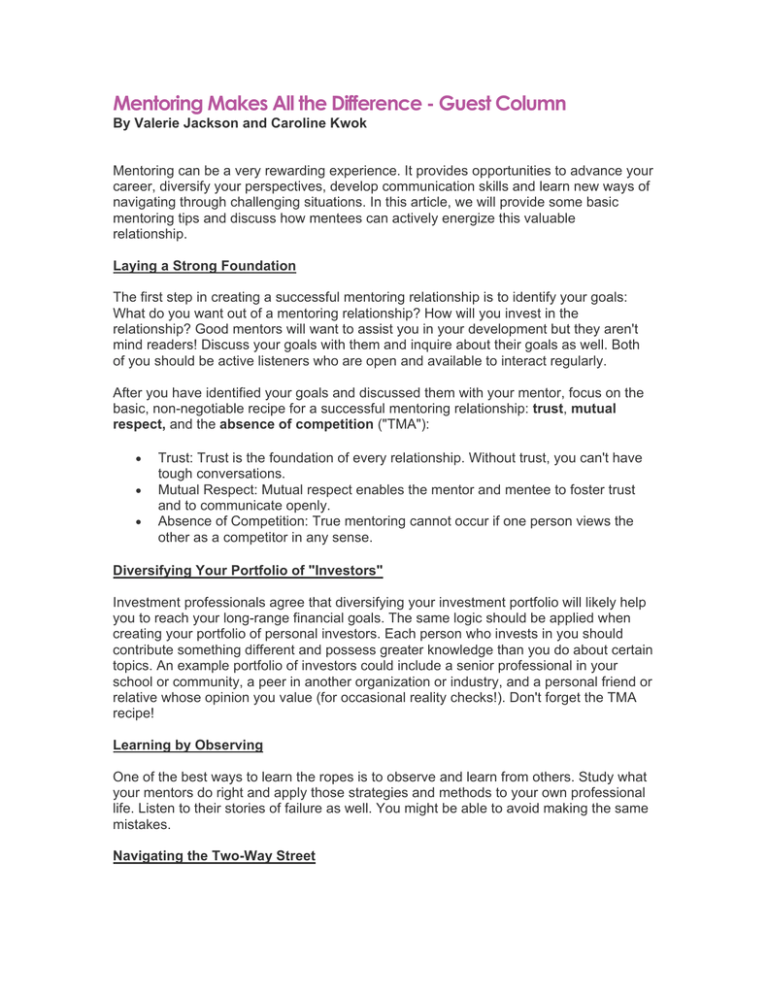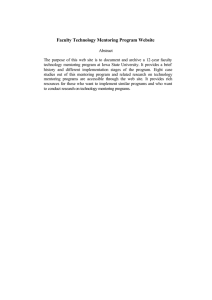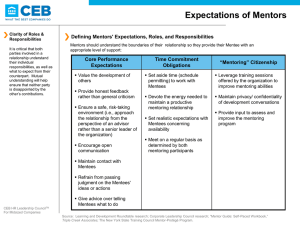Mentoring Makes All the Difference - Guest Column
advertisement

Mentoring Makes All the Difference - Guest Column By Valerie Jackson and Caroline Kwok Mentoring can be a very rewarding experience. It provides opportunities to advance your career, diversify your perspectives, develop communication skills and learn new ways of navigating through challenging situations. In this article, we will provide some basic mentoring tips and discuss how mentees can actively energize this valuable relationship. Laying a Strong Foundation The first step in creating a successful mentoring relationship is to identify your goals: What do you want out of a mentoring relationship? How will you invest in the relationship? Good mentors will want to assist you in your development but they aren't mind readers! Discuss your goals with them and inquire about their goals as well. Both of you should be active listeners who are open and available to interact regularly. After you have identified your goals and discussed them with your mentor, focus on the basic, non-negotiable recipe for a successful mentoring relationship: trust, mutual respect, and the absence of competition ("TMA"): Trust: Trust is the foundation of every relationship. Without trust, you can't have tough conversations. Mutual Respect: Mutual respect enables the mentor and mentee to foster trust and to communicate openly. Absence of Competition: True mentoring cannot occur if one person views the other as a competitor in any sense. Diversifying Your Portfolio of "Investors" Investment professionals agree that diversifying your investment portfolio will likely help you to reach your long-range financial goals. The same logic should be applied when creating your portfolio of personal investors. Each person who invests in you should contribute something different and possess greater knowledge than you do about certain topics. An example portfolio of investors could include a senior professional in your school or community, a peer in another organization or industry, and a personal friend or relative whose opinion you value (for occasional reality checks!). Don't forget the TMA recipe! Learning by Observing One of the best ways to learn the ropes is to observe and learn from others. Study what your mentors do right and apply those strategies and methods to your own professional life. Listen to their stories of failure as well. You might be able to avoid making the same mistakes. Navigating the Two-Way Street Just as there are expectations for mentors, there also are expectations for mentees. Mentoring is not something that happens to you; you must be proactive and engaged. Show your mentors and investors how they will benefit from investing in you--add value to the relationship. If you invest wisely in and think critically about your mentoring relationships and your career, you certainly will reap the rewards! Author Notes: Valerie Jackson is a former securities lawyer and the Firmwide Director of Diversity & Inclusion at K&L Gates. Caroline Kwok has a Master's in Organization Development and is the Legal Recruitment & Development Regional Manager and Manager of Diversity & Inclusion for K&L Gates.

